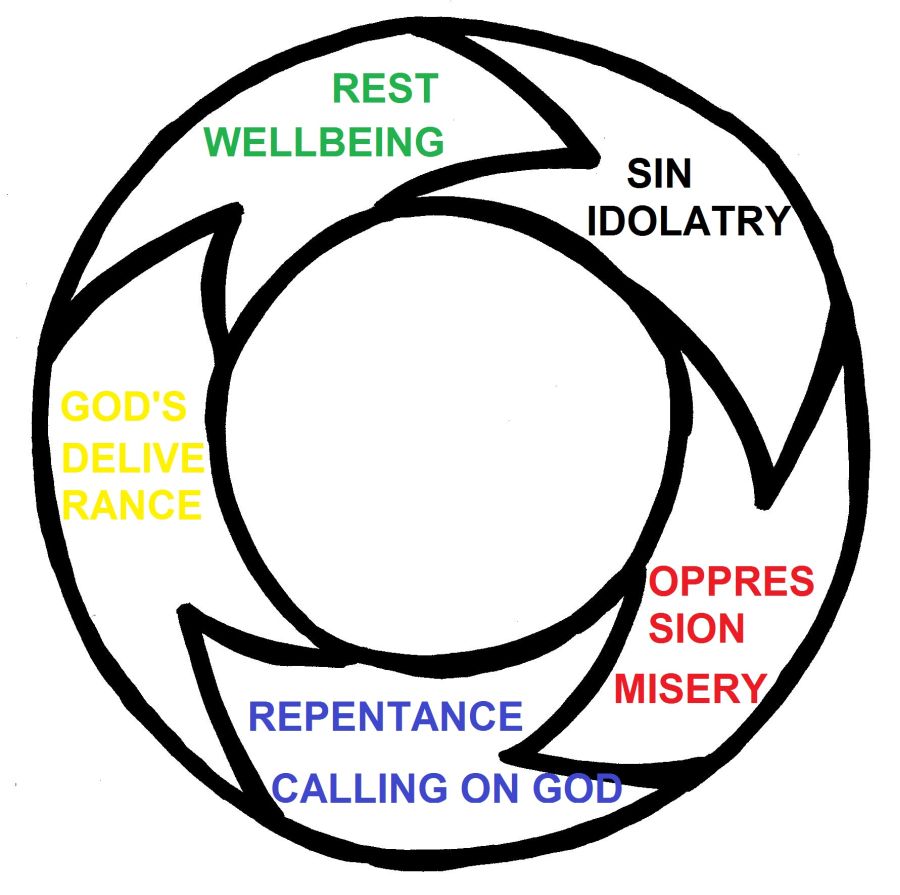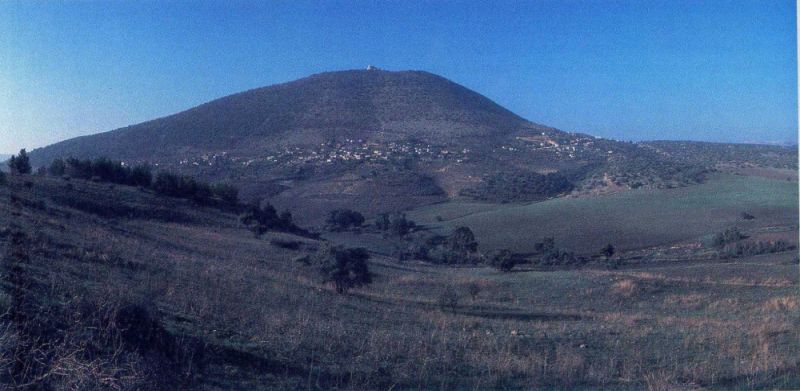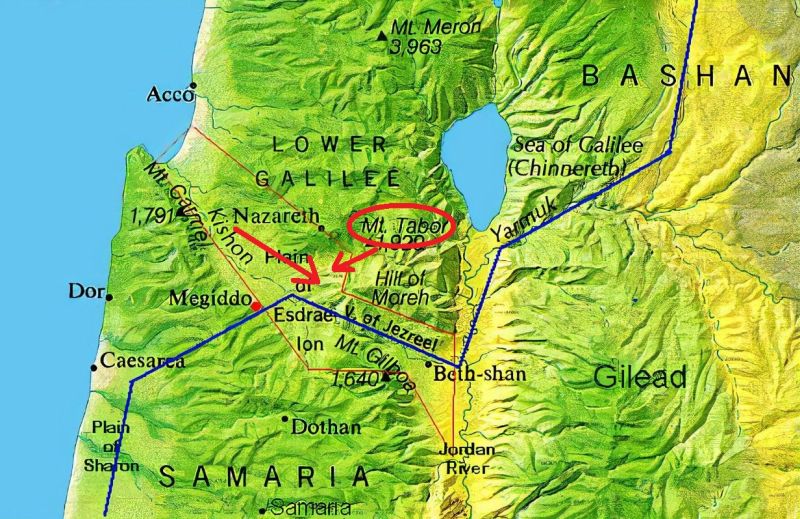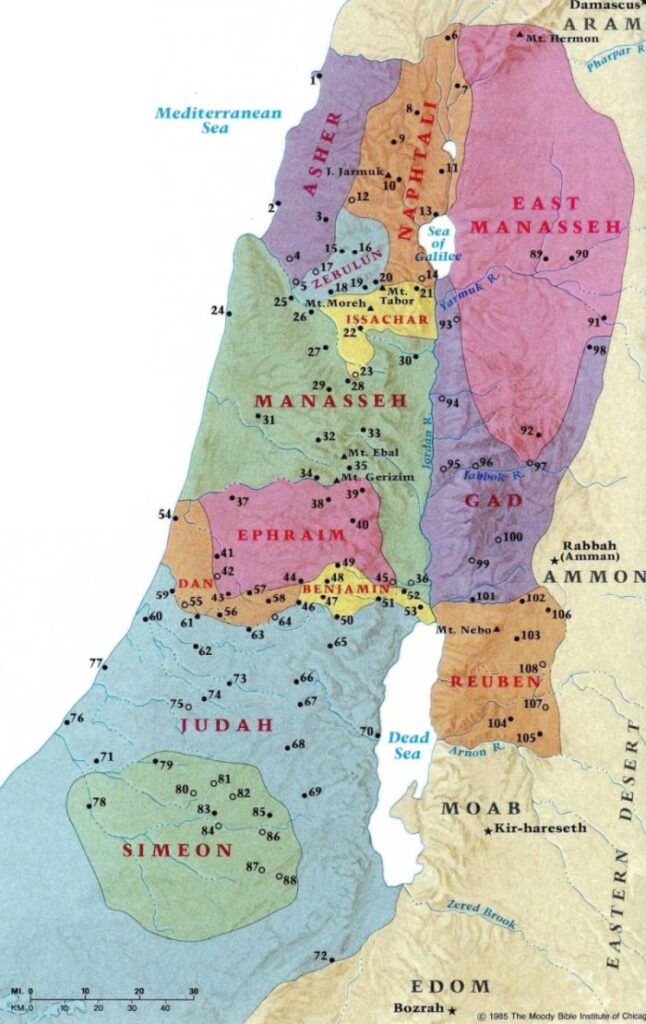Israel’s situation at the time of Deborah
Judges 4:1-3 “The Israelites again did what was evil in the sight of the LORD, after Ehud died. So the LORD sold them into the hand of King Jabin of Canaan, who reigned in Hazor; the commander of his army was Sisera, who lived in Harosheth-ha-goiim. Then the Israelites cried out to the LORD for help; for he had nine hundred chariots of iron, and had oppressed the Israelites cruelly twenty years.”
- The book of Judges describes cycles of Israel’s deterioration:
- Israel falls away from God into idolatry and lawlessness
- > God let’s them fall into misery through domination by surrounding nations
- > Israel cries out to God
- > God raises up a Judge-Deliverer
- > Israel enjoys a time of peace – and then the cycle starts again.
- Deborah is (together with Barak) the judge-deliverer in the 3rd cycle, before her it is Othniel of Judah and Ehud of Benjamin.
- The time it takes Israel to cry out to God is getting longer and longer, reflecting the increasing hardness of people’s hearts towards God.
- The oppressor of Deborah’s day is the Canaan King Jabin or Hazor and his iron chariot army commander Sisera of Harosheth-ha-goiim.
- The geographical information is important: Hazor is the strong northern city Joshua conquered (Jos 11:1-15) and that is part of the heartland of the tribe of Naphtali. This means what should have been

- Israel’s territory is now the stronghold of a Canaanite king, who oppresses the surrounding Israelite area.
- Harosheth-ha-goiim is a smaller city in the Jezreel valley, which is supposed to be the territory of the tribe of Asher, Issachar and Zebulun.
- This shows just how severely compromised Israel is at least in the North.
- Deborah calls Barak son of Abinoam of Kedesh, a city that is even north of Hazor.
- Barak is of Naphtali, one of the tribes most affected and called to arms by Deborah.
Deborah as a Judge
Judges 4:4-5 “At that time Deborah, a prophetess, wife of Lappidoth, was judging Israel. She used to sit under the palm of Deborah between Ramah and Bethel in the hill country of Ephraim; and the Israelites came up to her for judgments.”
- The book of Judges calls its God-appointed military deliverers “judges”, but only in the case of Deborah do we see her having the function of a civil judge, addressing the justice needs of the surrounding people, before she comes into the limelight.
What can we know about her life?
- Deborah is of the tribe of Ephraim, living between Bethel and Ramah. It is interesting that later judge Samuel will provide a similar service in the same geographical area: “Samuel went on a circuit year by year to Bethel, Gilgal, and Mizpah; and he judged Israel in all these places. Then we would come back to Ramah, for his home was there; he administered justice there to Israel” (1 Sam 7:15-17). The palm of Deborah seems to be the place she would sit and listen to accusations and defenses, investigations and witnesses.
- Deborah is married to Lappidoth, she is therefore a wife and likely also a family mother, as most women at the time would have been. There is no mention of her husband having any function, but he seems to support or at least not prevent his wife taking up the role of a judge and later a deliverer.
- Who appointed her as a judge? Did they follow the procedure of Deut 1:13-18 and Deut 16:18-20 in appointing her? This would then mean that women also were appointed into political leadership.
- Or is she an automatically-emerging leader, somebody whom people naturally trust, respect and seek out to receive judgments even though she does not have an officially sanctioned role? Actually, all leadership was to a degree meant to arise in this way, as judges were chosen by others based on their good reputation, experience or past actions (Deut 1:13).
- However she came by the role of a judge, it is clear that people trust Deborah, respect her, consider her an authority, capable of rendering just judgment and that’s why they seek her out voluntarily. Is seems that as also in Deut 1 she doesn’t have a government police force to implement her judgments, her authority and effectiveness come from people voluntarily seeking her out and respecting her.
- She is called a prophetess, meaning a female prophet, somebody who speaks the Word of God or brings the perspective of God to current issues.
- Were judges generally prophetic? Did prophets generally have judge-like functions? It doesn’t seem so, though in the life of Samuel most clearly (1 Sam 3, 7) and also in the life of Nathan (2 Sam 12) we see similar patterns.
Deborah as a Prophetess and Judge-Deliverer
Judges 4:6-7 “She summoned Barak son of Abinoam from Kedesh in Naphtali, and said to him, “the LORD, the God of Israel commands you, ‘Go, take position at Mount Tabor, bringing ten thousand from the tribe of Natphtali and the tribe of Zebulun. I will draw out Sisera, the general of Jabin’s army, to meet you by the Wadi Kishon with his chariots and his troops; and I will give him into your hand.”
- We do not know whether Deborah gave other prophetic words before, only this courageous prophecy and call to arms is recorded, doubtless the greatest moment of crisis and challenge in her life.
- She prophetically knows who to call, and what to tell him, and though it is not exactly clear how she ended up with the authority and trustworthiness, Barak seems to know her, respect her and obey her.
- She gives him advance knowledge of a coming attack by Sisera’s chariot army – or more likely: it is by Barak’s mustering of an army that Sisera’s troops will be drawn out (Judg 4:12). Whichever way, Deborah and Barak here do not evade but face the challenge head-on.
- Mount Tabor is a steep hill on the North-slope of the Jezreel valley, a fertile and relatively flat area, watered by the river Kishon.
- The geography is important: Iron chariots display their full force on flat ground, where horses can run with ease and speed adds to the menace of the onslaught against opposing foot soldiers. It is the rreason the Jezreel valley and the Coastal areas are under the dominion of the Canaanites, Israel is only successful at holding the hilly areas. To run down Mount Tabor gives an advantage to foot soldiers, but once they are down in the valley, iron chariots will have the advantage.
Team work
Judges 4:8-10 “Barak said to her, “If you will go with me, I will go; but if you will not go with me, I will not go.” And she said, “I will surely go with you; nevertheless, the road on which you are going will not lead to your glory, for the LORD will sett Sisera into the hand of a woman.” Then Deborah got up and went with Barak to Kedesh, and ten thousand warriors went up behind him; and Deborah went up with him.”
- Barak well knows what it means to provoke the Canaanite armies.
- As a person living in Kedesh, he probably has dealt with oppression by the Canaanites most of his life (at least the last 20 years, Judg 4:3) and is from a tribe most affected by the Canaanites, which gives him motivation, but likely also reasonable fear.
- Barak trusts, respects and obeys Deborah, but he is also desperately aware of his need for the prophetic word of God, so he demands for Deborah to join him.
- He is honest and real here, though timid.
- Deborah is willing to join him, displaying her trust in God’s word that came through her: for her as a woman to join this war and be a chief advisor is definitely a risk. But she is willing to take this risk, if it helps Barak.
- We see here an interesting team work between two very different leaders and roles: One is the female prophetic, senior advisor with authority and respect, the other is the (probably young) male military leader, who will display courage, risk-taking and run before the troops.
- Deborah contributes what Barak doesn’t have and Barak does what Deborah can’t really do.
- The fact that Barak manages to recruit 10’000 troops from Naphtali and Zebulun for this suicidal mission shows, that he has leadership capability and the trust of the people as well.
- It also seems that Sisera is aware of Barak from before (Judg 4:12).
- Yet is seems that Barak’s timidity will cost him ‘glory’, Deborah predicts that the glory for the victory over Sisera will go to a woman (Judg 4:9).
- This, as it turns out, does not refer to Deborah, it refers to Jael, a Kenite woman who ends up killing the mighty army captain Sisera who while fleeing takes refuge in her tent.
- So the glory goes to Jael, more than to Deborah or Barak, but what is that in comparison with a resounding victory and the end of Canaanite oppression?


The war
- Barak’s mustering of an army and taking positions on Mount Tabor promptly results in Sisera bringing out his full 900 strong elite chariot army and other troops (Judg 4:13) and moves East along the river Kishon in the flat Jezreel valley.
- Deborah gives the signal: “Up! For this is the day on which the LORD has given Sisera into your hand. The LORD is indeed going out before you”.
- Barak trusts God’s word through Deborah, rises to the occasion and runs down Mount Tabor before his 10’000 soldiers towards the Kishon to engage Sisera.
- God helps in two ways: he “threw Sisera and all his chariots and all his army into a panic before Barak” resulting in Sisera fleeing on foot and Barak chasing the charitos back towards Harosheth-ha-goiim, resulting in a total victory.
- But why would Sisera flee on foot? And why did the chariots not impact the battle on the flat land?
- Deborah’s song of victory (Judg 5:4, 21) sheds further light: “LORD, when you went out … the earth trembled, and the heavens poured, the clouds indeed poured water … the torrent Kishon swept them away, the onrushing torrent, the torrent of Kishon.”
- It seems that God sent a torrential rain, which lead to a flash flood by the river Kishon, resulting in muddy conditions in which all the advantage of the heavy iron chariots is offset in a second.
- Sisera upfront was likely the first to get stuck, which is why he fled on foot, while his army tried to turn around.
- While Barak is inflicting a crushing defeat on the fleeing chariots and troops, Sisera flees in the confusion of battle and takes refuge in the tents of the Kenites.
- The Kenites are descendants of Hobab, the son of Moses’ Midianite father-in-law. The Kenites were friendly with the Israelites, but also “there was peace between King Jabin of Hazor and the clan of Heber the Kenite”, (Judg 4:17), one clan of the Kenites (Judg 4:11).
- Heber’s wife Jael actively reaches out to the fleeing Sisera, hides him in her tent and provides him drink, but when he falls asleep in exhaustion she kills him with a tent peg (Judg 4:18-21, 5:24-27).
- She must have known Sisera, and also Barak, for she addresses them both specifically.
- What made her take this bold step, when her was officially at peace with the Canaanites and when – as a smaller clan that ends up between two warring fronts – they were definitely vulnerable?
- Maybe it was years of watching Israel’s oppression by the Canaanites? We do not know.
A difficult aspect of this story
- Deborah’s song of victory sheds further light on the issue of the collaboration between Israel’s different tribes.
- The story mentioned that Barak was to recruit 10’000 from his own tribe Naphtali and the tribe of Zebulun, which are geographically close and likely both most affected by the Canaanite oppression.
- In Deborah’s song they are praised for their courage (Judg 5:18).
- Judg 5:14-15 also mentions that the tribes of Ephraim, Benjamin, Issachar joined Deborah and Barak’s initiative, they “came with Deborah” and “were faithful to Barak”.
- But it is also revealed that the tribes of Reuben, Gilead, Dan and Asher did not respond to the call (Judg 5:15-17).
- Reuben and Gilead are Transjordan tribes (East Manasseh is not mentioned), so it could be distance that discouraged them.
- Interestingly Asher and Dan would likely have been affected by Canaanite oppression (being north), but they are not joining the war: “Dan, why did he abide with the ships? Asher sat still at the coast of the sea.”
- Other tribes not mentioned are West Manasseh, Judah and Simeon, maybe because they were further south? Yet Benjamin came. Ephraim is not specifically mentioned, but is assumed to be involved because it is Deborah’s tribe.

- Deborah’s song also contains a curse: “Curse Meroz, says the angel of the LORD, burse bitterly its inhabitants, because they did nto come to the help of the LORD, to the help fo the LORD against the mighty” (Judg 5:23).
- This city is not mentioned anywhere else in the Old Testament, so it is unclear what this refers to.
- Maybe it was a little Israelite city in the area of this war that refused to help or maybe prevented Barak’s advance?
- All in all these intertribal issues show that Israel had no central government nor standing army and that inter-tribal support and relationships were at the discretion of the tribes.
The message
Judges 5:6-8 “In the days of Shamgar, in the days of Jael caravans ceased and travellers kept to the byways. The peasantry prospered in Israel, they grew fat on plunder, because you arose, Deborah, arose as a mother in Israel. When new gods were chosen, then war was in the gates. Was shield or spear to be seen among forty thousand in Israel?”
- This passage shows the cause for the trouble, exactly as in the Law of Moses: When Israel falls for idolatry, then political and economic problems will arise: The country will not have the strength to defend itself “was shield or spear to be seen?” and the resulting insecurity will negatively affect trade “caravans have ceased and travellers kept to the byways” and agriculture.
- Conversely, when God is obeyed like here through Deborah’s intervention, military victory, stability and consequently prosperity of the peasants, the weakest in society, will ensue.